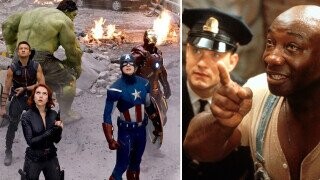Stephen King Shows The Perils Of Shared Universes

When movies and TV shows set up shared universes, they seem to take inspiration from comic books, which have been juggling this sort of thing for decades. But let's also tip our hats to individual authors who manage to maintain continuity across their large bodies of work, works that sometimes include very different books across very different genres. For example, every single one of Stephen King's books are connected. Maybe. Kind of. It's complicated.
His books will frequently mention elements from other books. For a while, the lynchpin of this King universe was his Dark Tower fantasy series, and the finale of that series featured a team-up of characters from several other stories, some very obscure.
Even separate from setting up climaxes, however, stuff from one story will pop up again in another. Know his time travel story 11/22/63, which became a TV series starring James Franco? In the book, the main character visits Maine and runs into the kids from It. A recent book of his about a hit man, Billy Summers, mentions the hotel from The Shining. They discuss its destruction, and the main character thinks a painting of the hotel may be haunted.
Don't Miss
So, that's kind of cool, seeing nods like this. But what happens when a story covers some events so wide and consequential that they can't possible gel with other stories? Like The Stand, where a plague wipes out most of humanity, or other semi-apocalypses in Cell or The Mist? Well, these are alternate universes ("different levels of the Tower," as the books sometimes call them), but are still part of the same multiverse, so some items or people might still bleed over between universes.
Fine, fine. But then you get stories that are incompatible even with that loose multiverse, and that's when we really see the limits of the shared universe.
Stephen King's darkest book might be his 2014 novel Revival. Without going too much into detail, the book ends up saying something about what happens after death, and this isn't something that happens in one universe but not others, in the way that one universe might have Coca Cola and another might have Nozz-A-La Cola. It's what happens after death period, and if true, it rules out ghosts, reincarnating in a different world, and all the other afterlife stuff covered in existing King stories.
How does this fit into the King shared universe? Simple: It doesn't. The book never claims it does, and that lets it really get creative.
That solves the problem just fine. Unless you're one of those fans who scour every book for Easter eggs and references, taking each as proof of a shared universe, wrongly believing this has to improve the story.
Fans tend to do that. Take Pixar movies. Pixar movies keep referencing each other, and if you really think about it, some of these references prove the movies don't share a universe. Though A Bug's Life and Toy Story COULD share a universe, since they're both just our world with other hidden stuff going on, the Bugs' Life characters pop up in a painting in Toy Story 2, which makes no sense as anything but an Easter egg. Still, many fans like to imagine the movies all combine into a single story. The most popular version of this theory actually cites a Cracked After Hours video as the inspiration, but that video ends with the gang realizing a bunch of Pixar movies really just exist as their own things and that's okay.
So, you can have your shared universe for some ongoing stories, but you mustn't let it limit you. Stephen King can keep writing about kids with psychic powers, and we can imagine that one cause links them all. But he can also one day declare, forget the entire multiverse mythology I invented, for this story, I'm going to say Lovecraft was right. Or, he can write a strange one-off story about the world or multiverse ending when one guy dies, because we all contain multitudes.
Any story constrained by the laws of shared universes can only go so far. It's why, say, we're never going to get a Marvel film revealing that immortal guardians have been protecting the world for thousands of years and that the whole Earth is just an egg for some alien god. Well, I guess we could get that, but to make it fit with established stories, they'd have to make it really really stupid.
Follow Ryan Menezes on Twitter for more stuff no one should see.
